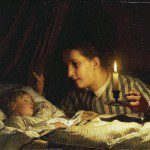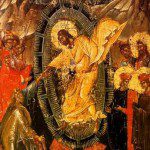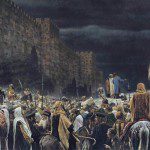Listening to the audio edition of Atul Gawande’s Being Mortal consoles me as I drive around town doing relatively mindless errands. It also renews my gratitude for a childhood spent in a three-generation household. My father’s parents welcomed him, his wife, and two small children into their small Los Angeles duplex upon their return from several years at a mission school for orphans in South India. Grandma cared for us while our parents were at work and read Winnie-the-Pooh aloud from her rose-colored rocking chair more evenings than she had probably counted on. Later we all moved into the same house. Until Grandpa died in my early adolescence there were four adults and two children at the dinner table every night.
Dinners were prolonged by stories that provided a felt sense of history—Dad’s accounts of odd moments in the Air Force fueling bombers in England and foraging in London bookshops for antique maps; Grandpa’s wanderings from a North Carolina farm to osteopathic practice in Missouri, potato farming in Idaho, God-knows-what in Alaska, and railroad work in California. By the time I knew him he was spending his days doing the gardening he loved on our suburban half acre as well as in neighbors’ vegetable patches. Grandma had taught in a one-room schoolhouse, and in half a dozen public schools during the Depression. Mom’s father had been mayor, grocer, pastor, and pioneer farmer in a small town in California’s Imperial Valley. They were lively raconteurs. They were politically and theologically opinionated. They were all, as far as I knew, healthy until the night Grandpa suddenly died.
He went the way most of us want to: peacefully, in his sleep, after a good dinner, having read the evening paper and gone to bed at the usual time. Mom got us out of bed to go see him before the coroner arrived. She wanted us to know what death looked like before the funeral folk masked it with make-up and organ music—still and white and not at all like sleep. People from the church brought more food than we could eat—a custom that struck me as both touching and a little bizarre, since no one had much of an appetite—especially Grandma. Still, the casseroles and cakes made kindness visible.
Grandma died at 94, having lived most of her later life at home with family and a companion hired to supplement Mom’s efforts to care for her. Perhaps not coincidentally, Mom died at the same age—94. Dad died in his 80s, awake and aware to the end, still eager to let us know what he thought and able to relax into long readings of Psalms. So my brother and I had ample opportunity to witness the ways of aging. We heard about bunions and arthritis, digitalis and antacids. Until the very last stretch of their journeys, the adults we loved remained largely capable, resilient, and willing to laugh, even at themselves. They were, as Mom put it of elders she admired, “growing old gracefully.” In their company, we learned to be frank about death and about the limitations of later life. We were taught early and often the respect for elders that is reinforced by seeing resilience and reflection and redirection of energies in gradual accommodation to waning physical powers.
None of our elders were people who clutched at youth. Their faith gave them a story line that eased the losses of age and fear of death: Trust and obey; this life is a journey, this train is bound for glory, God walks with us in the Valley of the Shadow, grace will lead me home. They were glad to live and mostly unafraid to die, though none of them looked forward to dying; I never heard of depression until I left home.
But I did hear of death, and saw it happen, and for that I’m grateful. A great gift one generation can impart to the next is to teach by gracious example that death comes to us all—to some slowly, to some suddenly, to some with pain, to some in ways that demand enormous patience—and that we can live with and live into that truth boldly and generously. They resisted, and I hope to resist, the seductions of collective self-deception about death that lead us to hide it and hide from it. If we embrace it together we may find, as my family did, that the gift of a good death blesses those who go and those who stay.
















